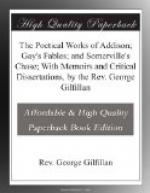Addison’s arrival in England seems to have synchronised or preceded the great tempest of November 1703, to which we have already referred, and to which he afterwards alludes in his simile of the Angel in “The Campaign”—
“Such as of late o’er pale Britannia past.”
Our readers will find a sketch of this terrific tempest in the commencement of Ainsworth’s “Jack Shepherd.” Macaulay says of it, “It was the only tempest which, in our latitude, has equalled the rage of a tropical hurricane. No other tempest was ever in this country the occasion of a Parliamentary address, or of a national fast. Whole fleets had been cast away. Large mansions had been blown down; one prelate had been buried beneath the ruins of his palace. London and Bristol had presented the appearance of cities just sacked. Hundreds of families were thrown into mourning. The prostrate trunks of large trees, and the ruins of houses attested, in all the southern counties, the fury of the blast.” How Addison felt or fared during this storm, we have no means of knowing. Perhaps his timid nature shrank from it in spite of its appeal to imagination, or perhaps the poetry that was in him triumphed over his fears, and as he felt what Zanga was afterwards to say—
“I love this rocking of the battlements,”
the image of the Angel, afterwards to be dilated into the vast form of Wrath, described in the “Campaign,” rose on his vision, and remained there indelibly fixed till the time arrived when, used with artistic skill, it floated him into fame.
Meanwhile, he spent this winter and spring of 1703-4 in a rather precarious manner, and like a true poet. He was lodging in an obscure garret in the Haymarket, up three stairs, when one day the Right Honourable Henry Boyle, the Chancellor of the Exchequer, called on him and communicated a project that had been concocted between Godolphin and Halifax. The Whigs were now again in the ascendant, and the battle of Blenheim, fought on the 13th August 1704, had brought their triumph to a climax. Halifax and Godolphin were mortified at the bad poems in commemoration of it which poured from the press. Their feeling was sincerely that which Byron affected in reference to Wellington and Waterloo—




